Hyundai Kona vs Toyota Aygo - Differences and prices compared
Compare performance (218 HP vs 72 HP), boot space and price (23100 £ vs 15500 £) at a glance. Find out which car is the better choice for you – Hyundai Kona or Toyota Aygo?
Costs and Efficiency:
Price and efficiency are key factors when choosing a car – and this is often where the real differences emerge.
Toyota Aygo has a decisively advantage in terms of price – it starts at 15500 £, while the Hyundai Kona costs 23100 £. That’s a price difference of around 7552 £.
Fuel consumption also shows a difference: Hyundai Kona manages with 4.60 L and is therefore minimal more efficient than the Toyota Aygo with 4.80 L. The difference is about 0.20 L per 100 km.
Engine and Performance:
Power, torque and acceleration are the classic benchmarks for car enthusiasts – and here, some clear differences start to show.
When it comes to engine power, the Hyundai Kona has a significantly edge – offering 218 HP compared to 72 HP. That’s roughly 146 HP more horsepower.
In acceleration from 0 to 100 km/h, the Hyundai Kona is convincingly quicker – completing the sprint in 7.80 s, while the Toyota Aygo takes 15.50 s. That’s about 7.70 s faster.
In terms of top speed, the Hyundai Kona performs distinct better – reaching 210 km/h, while the Toyota Aygo tops out at 158 km/h. The difference is around 52 km/h.
There’s also a difference in torque: Hyundai Kona pulls significantly stronger with 265 Nm compared to 93 Nm. That’s about 172 Nm difference.
Space and Everyday Use:
Cabin size, boot volume and payload all play a role in everyday practicality. Here, comfort and flexibility make the difference.
Seats: Hyundai Kona offers a bit more seating capacity – 5 vs 4.
In curb weight, Toyota Aygo is evident lighter – 1015 kg compared to 1370 kg. The difference is around 355 kg.
In terms of boot space, the Hyundai Kona offers clearly more room – 466 L compared to 231 L. That’s a difference of about 235 L.
In maximum load capacity, the Hyundai Kona performs evident better – up to 1300 L, which is about 471 L more than the Toyota Aygo.
When it comes to payload, Hyundai Kona evident takes the win – 490 kg compared to 345 kg. That’s a difference of about 145 kg.
Who comes out on top?
Overall, the Hyundai Kona shows itself to be outperforms in nearly all aspects and secures the title of DriveDuel Champion.
It convinces with the more balanced overall package and proves to be the more versatile choice for everyday use.

Hyundai Kona
Costs and Consumption
View detailed analysis
Engine and Performance
View detailed analysis
Dimensions and Body
View detailed analysis
Hyundai Kona
The Hyundai Kona wears its personality on the outside with bold styling and sprightly handling that turns city driving into something a little more fun than a commute. It blends practical space, modern tech and sensible running costs into a compact, stylish package — a smart pick if you want flair without paying luxury prices.
details



Toyota Aygo
The Aygo is a cheeky city car that turns congested streets into a playground, with bold styling and sprightly manners that make parking a pleasure rather than a pain. Economical to run and surprisingly well equipped for its size, the Aygo is a smart choice for urban buyers who want personality without a premium price and a car that brings a smile to the daily commute.
details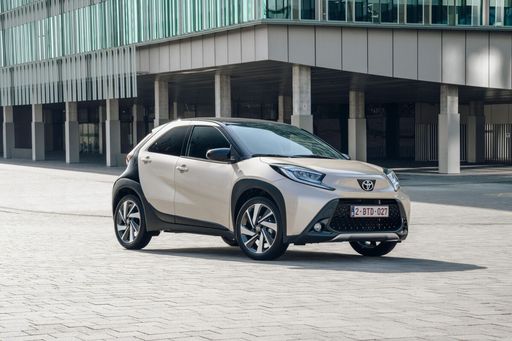
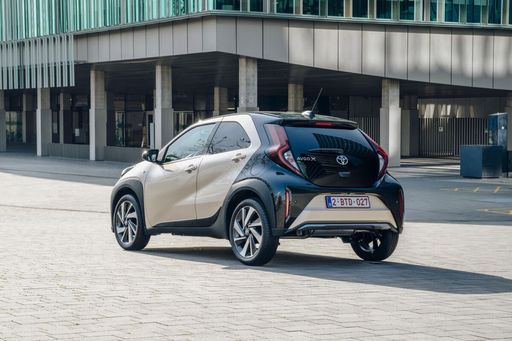
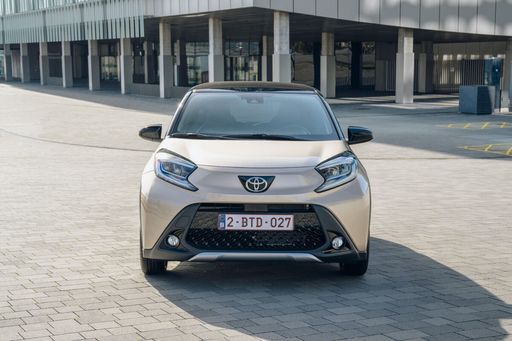
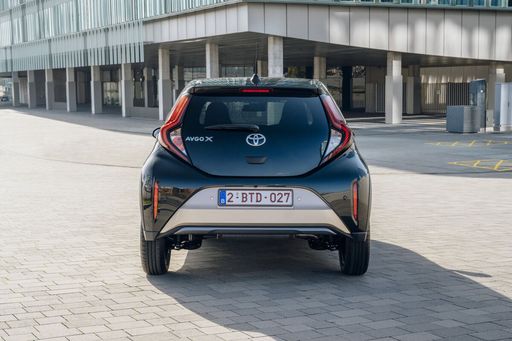
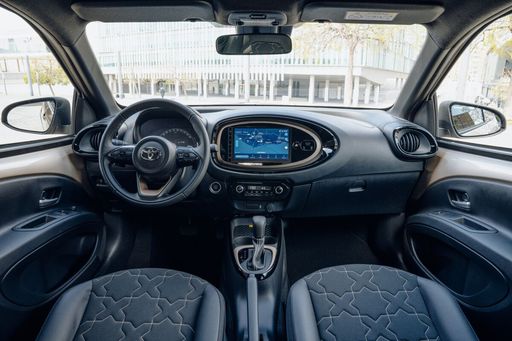
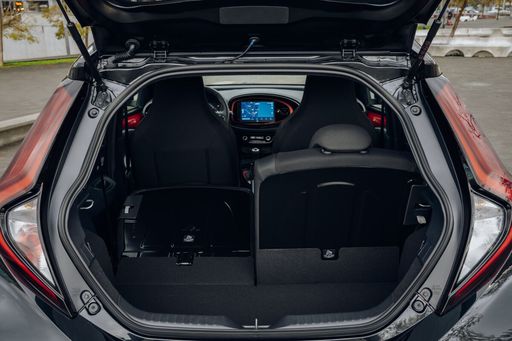

|

|
|
|
|
Costs and Consumption |
|
|---|---|
|
Price
23100 - 41600 £
|
Price
15500 - 22100 £
|
|
Consumption L/100km
4.6 - 7 L
|
Consumption L/100km
4.8 - 4.9 L
|
|
Consumption kWh/100km
14.6 - 16.8 kWh
|
Consumption kWh/100km
-
|
|
Electric Range
377 - 514 km
|
Electric Range
-
|
|
Battery Capacity
1.3 - 65.4 kWh
|
Battery Capacity
-
|
|
co2
0 - 163 g/km
|
co2
108 - 111 g/km
|
|
Fuel tank capacity
38 - 47 L
|
Fuel tank capacity
35 L
|
Dimensions and Body |
|
|---|---|
|
Body Type
SUV
|
Body Type
SUV
|
|
Seats
5
|
Seats
4
|
|
Doors
5
|
Doors
5
|
|
Curb weight
1370 - 1773 kg
|
Curb weight
1015 kg
|
|
Trunk capacity
466 L
|
Trunk capacity
231 L
|
|
Length
4350 - 4385 mm
|
Length
3700 mm
|
|
Width
1825 mm
|
Width
1740 mm
|
|
Height
1580 - 1585 mm
|
Height
1510 mm
|
|
Max trunk capacity
1300 L
|
Max trunk capacity
829 L
|
|
Payload
420 - 490 kg
|
Payload
345 kg
|
Engine and Performance |
|
|---|---|
|
Engine Type
Electric, Petrol, Full Hybrid
|
Engine Type
Petrol
|
|
Transmission
Automatic, Manuel
|
Transmission
Manuel, Automatic
|
|
Transmission Detail
Reduction Gearbox, Manual Gearbox, Dual-Clutch Automatic
|
Transmission Detail
Manual Gearbox, CVT
|
|
Drive Type
Front-Wheel Drive, All-Wheel Drive
|
Drive Type
Front-Wheel Drive
|
|
Power HP
115 - 218 HP
|
Power HP
72 HP
|
|
Acceleration 0-100km/h
7.8 - 11.9 s
|
Acceleration 0-100km/h
15.5 - 15.6 s
|
|
Max Speed
162 - 210 km/h
|
Max Speed
151 - 158 km/h
|
|
Torque
200 - 265 Nm
|
Torque
93 Nm
|
|
Number of Cylinders
3 - 4
|
Number of Cylinders
3
|
|
Power kW
85 - 160 kW
|
Power kW
53 kW
|
|
Engine capacity
998 - 1598 cm3
|
Engine capacity
998 cm3
|
General |
|
|---|---|
|
Model Year
2024 - 2025
|
Model Year
2024 - 2025
|
|
CO2 Efficiency Class
A, D, C, E, F
|
CO2 Efficiency Class
C
|
|
Brand
Hyundai
|
Brand
Toyota
|
Is the Hyundai Kona offered with different drivetrains?
Available configurations include Front-Wheel Drive or All-Wheel Drive.
The prices and data displayed are estimates based on German list prices and may vary by country. This information is not legally binding.
